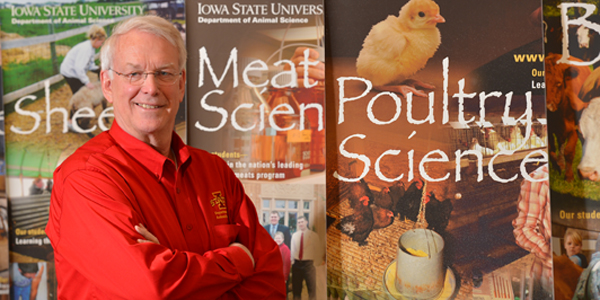
Meeting The Food Production Challenge
It’s a source of great pride for Iowa State University to connect to farmers to science. It’s what we do. Science, from conception to consumption, has directly influenced the improvement of livestock and poultry.
When the land-grant system of higher education was initiated more than 150 years ago, it was the first time that a publicly supported research and extension program was established to improve food production and the lives of farmers engaged in feeding this country.
It’s proven to be the envy of the world. Public funding encouraged the distribution of unbiased, science-based information. Linking the science to the farmer led to significant improvements in production and profitability in rural communities.
Examples are plentiful of applying science to solve problems or improve efficiency for livestock and poultry producers:
- Development of scientific testing and the application of genetic principles led to elimination of porcine stress syndrome (PSS) in swine.
- Genetics research that eliminated defects such as dwarfism in beef cattle.
- Research-based feeding regimes to reduce sulfur toxicity in feedlot cattle that are fed distillers grains with high levels of sulfur.
- Artificial insemination and embryo transfer have greatly improved the efficiency of production and accelerated livestock genetic improvement.
- Improved animal health through better vaccines has improved profitability, animal welfare and food safety.
- Application of manure management techniques has improved water quality and better utilization of nutrients in crop production.
- Research on animal behavior and stress physiology has positively influenced how modern animal housing is constructed.
- It is a true dialogue. Scientific results prompted the farmer to ask further questions, stimulating creative thinking on how new research could make improvements. Science is an integral component to problem-solving on the farm.
One way we sustain this dialogue in our Department of Animal Science at Iowa State University is through an external advisory committee, which brings scientists and the livestock and poultry industry together. We convey research progress to the industry. Our faculty scientists and extension specialists can interact with producers to better understand their priorities and challenges. Strong communication ties are essential to make sure science and technology are transferred quickly.
Now more than ever that’s important. Projections of a growing global population and the need to double food production over the next 40 years will require a rapid rate of application of new technologies. New scientific advances in livestock production systems will need to minimize environmental impacts, lowering the carbon footprint per unit of food produced. They will need to produce safe, nutritious foods while simultaneously improving animal well-being. And, as we have strived for so many decades, they must help our farmers and their families thrive and remain in the business of protein production.
For this to work quickly and efficiently will require strong and sustained public support and funding for research and extension of our food system.
The consumer is the ultimate benefactor. Science adopted by Iowa’s livestock and poultry farmers should result in safe, wholesome and affordable food that is produced with minimal environmental impact and in a socially acceptable manner.



